In July and August 2015, Brazilian authorities freed 128 workers from conditions analogous to slavery on five coffee plantations in southern Minas Gerais. Danwatch came along on one inspection that led to the liberation of 17 men, women and children. According to the inspection report issued by the Ministry of Labour and Employment, the workers were victims of human trafficking, picking coffee without pay while they incurred debt to the plantation owner.
A cloud of red dust shrouds the four cars that race down the gravel road at 80-90 kilometres per hour. The caravan halts at a metal gate. Two police officers armed with automatic weapons and wearing bulletproof vests climb out of a four-wheel drive Mitsubishi. The inspectors from the Brazilian Ministry of Labour and Employment and the public prosecutor follow suit, but stay back while one of the officers breaks the coffee plantation’s lock with a crowbar.
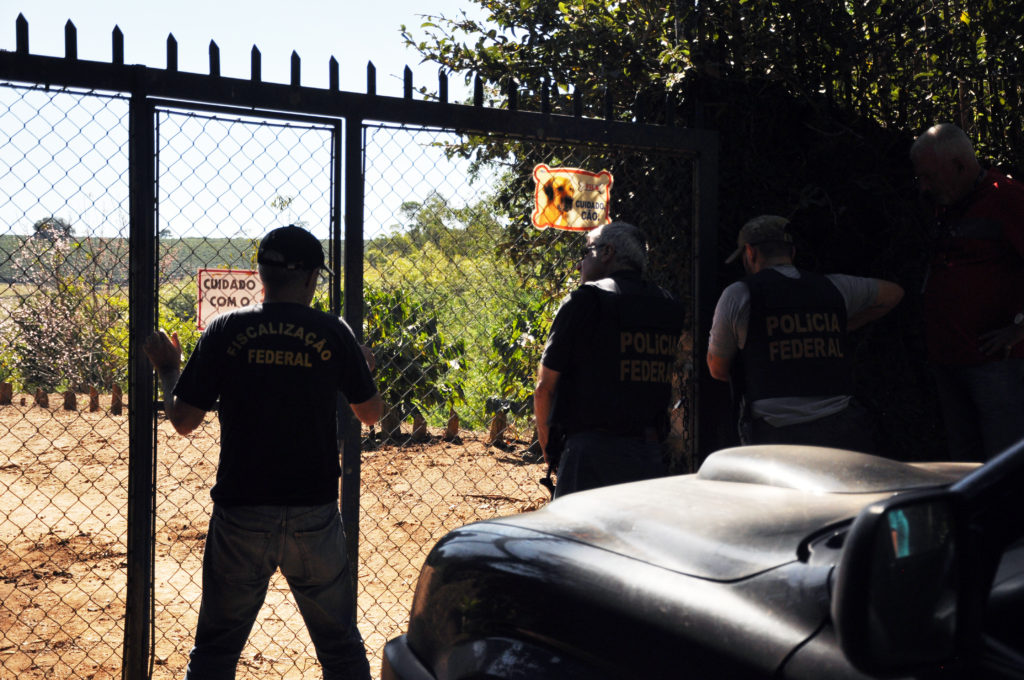
Police officers with automatic weapons and bulletproof vests break the coffee plantation’s lock with a crowbar. Photo: Danwatch.
Danwatch has obtained permission to accompany the Brazilian authorities as they liberate a group of workers from a coffee plantation in Minas Gerais.
Before the inspection began, the lead inspector gathered the team at a parking lot to brief them on the situation: the Ministry of Labour and Employment has received a tip that a group of migrant workers are being held under conditions analogous to slavery on a coffee plantation. Children are among them.
It will emerge that the workers have been victims of human trafficking. They have been picking coffee without pay, incurring debt to the plantation owner in the meantime; they have been harvesting without protective equipment; they have been living with their children in unsanitary conditions without access to clean drinking water; and two of the children have been missing school in order to pick coffee.
Garbage and food scraps everywhere
Now the metal gate is forced open, and the cars enter the property. One of the police officers catches sight of a man at the main building and runs in that direction as the cars drive deeper into the plantation. A beat-up black car, missing its license plate and one of its headlights, drives toward us. The workers in the car direct us to the building where the coffee pickers are housed. Discarded plastic and other kinds of garbage are strewn around the house where the inspectors ask the workers to be seated so they can begin their interrogations.
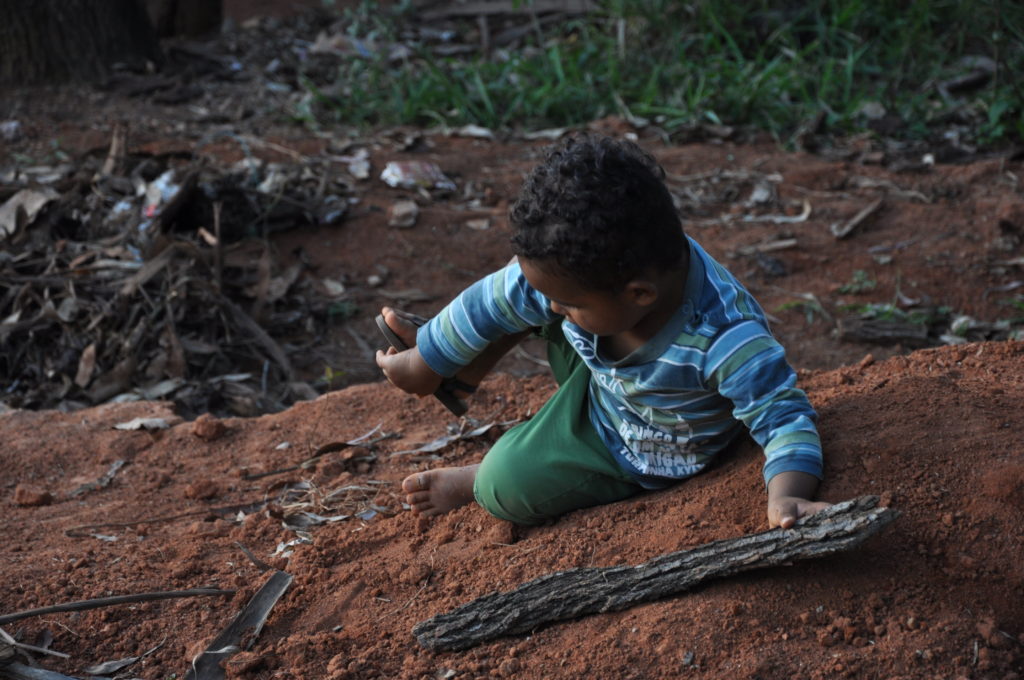
Little children play amid garbage that litters the ground near the building where the workers live. Photo: Danwatch.
Seventeen men, women and children live in the house. The unmarried men share a little room just large enough for three bunk beds. The families live in two larger, open rooms. The worn-out bunk beds and hole-riddled mattresses are pushed together in little islands to create a bit of privacy for each family.
On the gas stove next to the beds are pots containing rice and fish heads. In another room, the door can barely be opened. The upper level of a double bunk bed is filled with pots and pans holding pigs’ ears and other food. In the lower bunk, a little girl hides behind a curtain. She covers her mouth with her hands and looks up, terrified, as the curtain is pulled to one side.
Instructed to lie
Outside, the inspectors have finished questioning the first few workers, who unanimously claim to have arrived at the location only a couple of days earlier. The public prosecutor comes running up from the main building with a signed statement from the plantation owner confirming that the workers just arrived. The inspectors are bewildered. It is July 14, and the coffee harvest has been underway for a month and a half. Who has been picking the coffee until now, if these workers just got here?
The questioning of a worker in orange shorts has just concluded. He is about to sign his witness statement when he begins to shake. He breaks down. The team of workers has been here the whole time, he says.
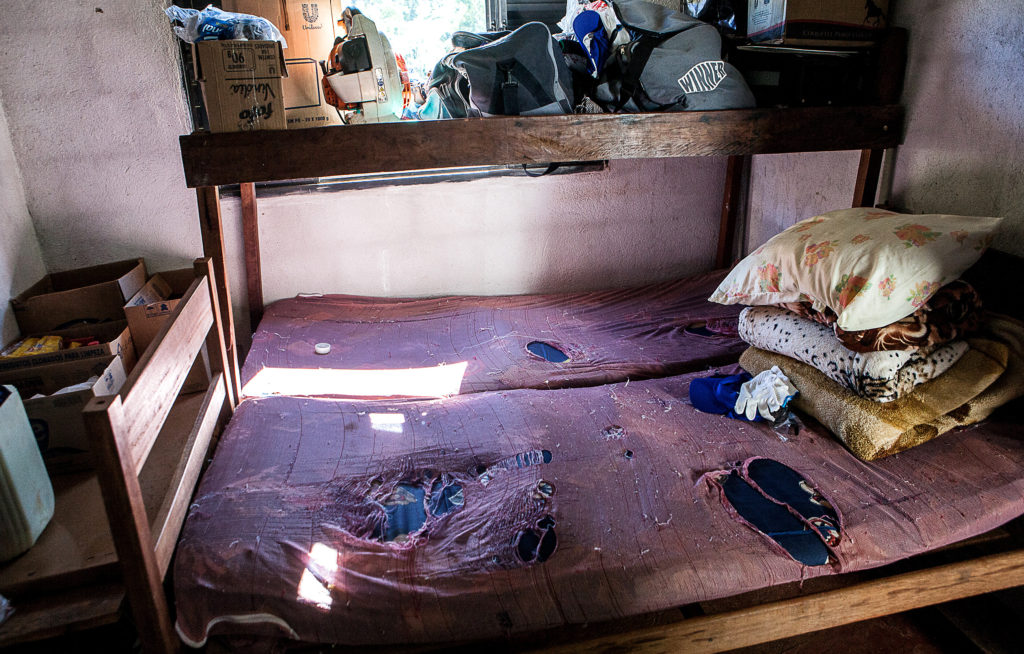
In the room where the families live, the mattresses are worn and full of holes. Photo: Maurilo Clareto Costa.
The team of workers has been here the whole time, he says. The lead inspector, Marcelo Campos, is almost finished questioning a worker in green shorts when he gets the message.
“You’ve just made a fool of me”, he says to the worker in the green shorts.
Campos’s brown eyes blaze as he asks the worker whether he plans to start telling the truth.
The interview begins again, and the worker tells Campos that the whole group left the neighbouring state of Bahia on May 22 and arrived at the plantation on May 23.
The plantation owner assembled all the workers the day before the inspection. “He told us that if any inspectors came, we should say that we just started to work on the plantation”, the worker says.
He says that until that week, the plantation owner had not asked for the workers’ Carteira de Trabalho, the official papers that guarantee access to social benefits like pension, sick pay, etc., and that they had been working without official contracts until then. Similarly, it was only in the week before the inspection that the plantation owner supplied the workers with the required safety equipment, such as gloves, hats and protective glasses.
Children picked coffee
The lead inspector, Marcelo Campos, begins to re-interview a worker wearing a Messi t-shirt.
“You lied to me. You lied in front of your children. You signed your name to false testimony. That is a crime, but I will give you one more chance”, he says.
The worker in the Messi t-shirt gives in and agrees to tell the truth. He confirms, as do the other coffee pickers on the plantation, that they have received no pay for their work. Instead, they have been given receipts for each 60-litre coffee sack they filled, and were told that their wages would not be paid until the end of the harvest. In the meantime, the workers have been buying goods from the local supermarket on the plantation owner’s credit. They were also told that they owed money for their bus ride to the plantation.
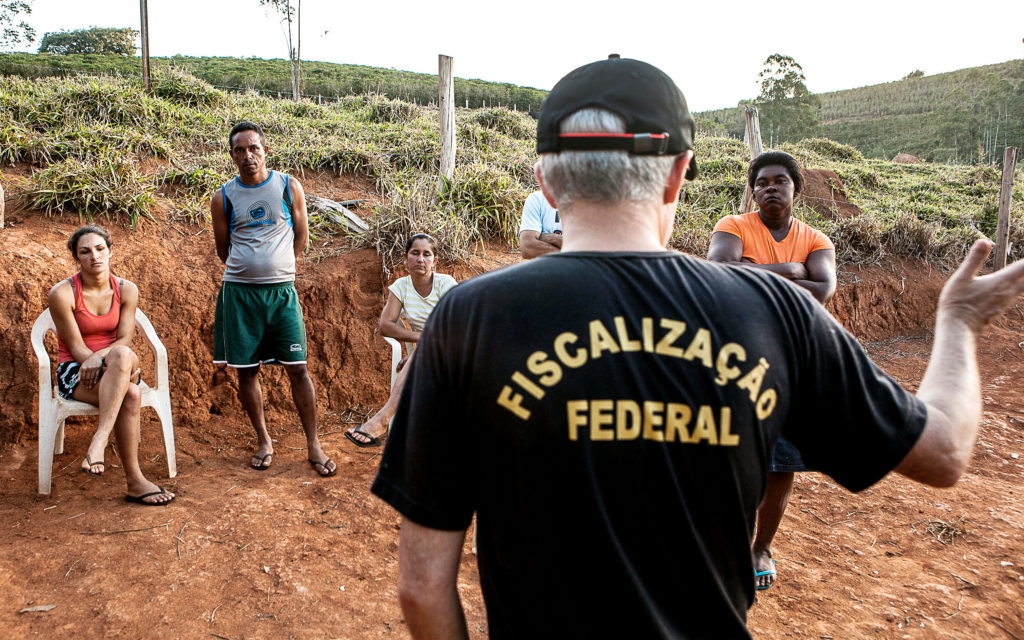
The inspectors interogate the workers about the conditions on the plantation. Foto: Maurilo Clareto Costa.
Campos tells the worker in the Messi t-shirt that it is illegal for his teenage son to be harvesting coffee – but if he had done so, it would be the plantation owner, and not his son, who would be punished. The father admits that his son took part in the harvest.
Now the teenage boys must be questioned. Campos sits opposite a boy wearing a pink t-shirt and white shorts. His mother stands beside him while the lead inspector explains that it is illegal for a boy his age to work, but that it is the plantation owner, and not the boy himself, who has committed a crime. Campos also assures him that the law guarantees that he will be compensated for his work, just like all the others, if only he tells the truth.
In his papers, Campos notes that the boy was born March 2, 2000.
The 15-year-old boy says that he came to the plantation on Saturday, May 23, with his family and the other workers from Bahia, and that he began to pick coffee with the others the following Monday. The boy worked in his own leather boots; the plantation owner did not give him the required protective equipment until that week, when the owner knew the inspectors would be coming. There were no tables on the plantation where they could sit and eat their lunch, and they had to go to the toilet in the bushes.
While the questioning of the 15-year-old boy continues in the shade of the house, the plantation owner becomes visible alongside his suit-clad attorney on a hilltop above the house. They keep their distance and observe the proceedings.
The 15-year-old boy explains that he goes to school in his hometown. He is working on the plantation during his vacation, but missed a month of lessons at home.
A tall inspector with glasses comes over to Marcelo Campos to say that the attorney is going to call the police. Campos, unmoved, continues his questioning of the boy.
“Do you want to go back to school?” he asks.
“Yes”, answers the boy.
“What do you want to do with your life?” asks Campos.
The boy answers that he wants to go to university and become a doctor or a lawyer. But what he really wants to do is become a professional football player. Sometimes they play matches here on the plantation, he says. He’s a defender.
The 15-year-old boy signs his witness statement.
Misses friends and school
The tall inspector with the glasses has started to interview the other teenage boy, who is wearing a blue-black shirt with a yellow Adidas logo on the back. The boy says that he usually stayed near the living quarters while the others picked coffee. It was his job to mind his three-year-old sister and two-year-old cousin, changing their diapers and bottle-feeding the littlest one during the day.
The inspector notes in his papers that the boy was born December 18, 2000. He is fourteen. At home in Bahia, his mother takes care of the small children, but while they are here, they are his responsibility, he says. He did pick coffee on two days, though. The boy forgets for a moment that he no longer needs to repeat the lies of the plantation owner, and he tells the inspector that everyone wore all the necessary safety gear. When the inspector reminds the boy that he already knows that the others did not receive safety equipment, and that he doesn’t have to lie any more, the boy admits that he picked coffee in his own tennis shoes, gloves and hat.
The inspector asks the boy how he felt after the first day he spent picking coffee.
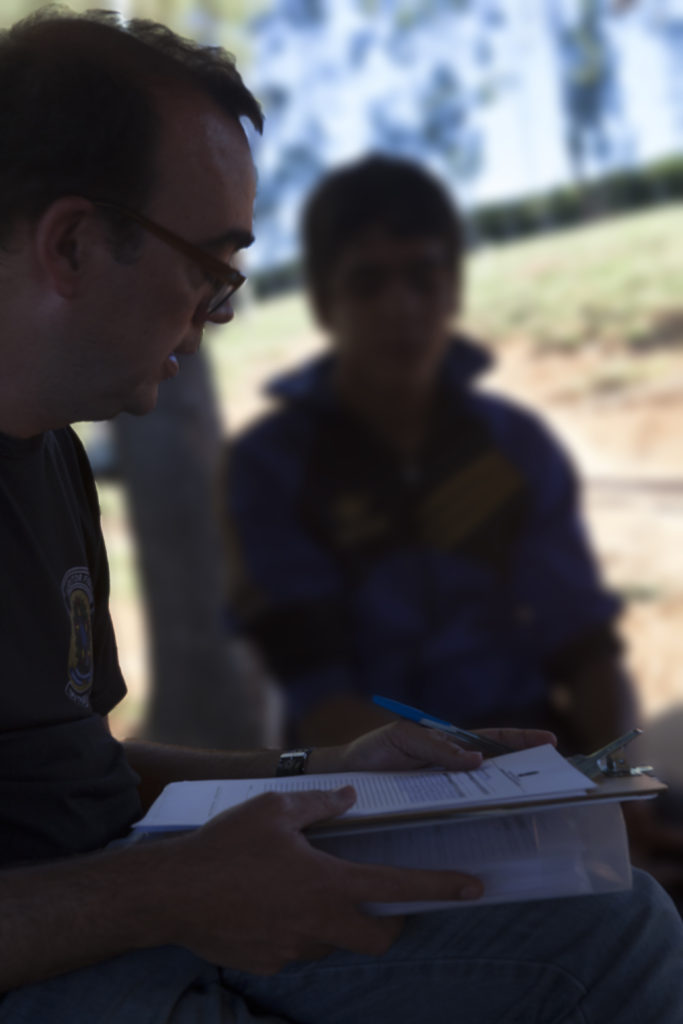
A 14-year-old boy who had been picking coffee at the plantation is interrogated by one of the inspectors from the Brazilian Ministry of Labour and Employment. Photo: Maurilo Clareto Costa.
“I felt tired. I wanted to sleep, and my arms hurt”, he says.
“What about the next day? Did it feel the same, or was it not as bad?”
“The second day I was a little less tired”, says the boy.
“Which do you prefer, working or playing?”
“Playing.”
“Why do you have to work?”
“To earn money.”
“If you didn’t have to earn money, would you rather play?”
“Yes.”
“Did you get money for your work?”
“No.”
“Do you have any idea when you’re going to get the money?”
“No.”
“Do you like it better being here, or being at home?”
“I like it better at home.”
“Do you miss your friends and your school?”
“Yes.”
The boy says that he is enrolled in the 8th grade at a school in Bahia. He hasn’t been to any classes while he has been on the plantation, but he brought a schoolbook with him from home. He’s on vacation now, but he missed a month of school, he says. The inspector asks whether it will cause problems for him when he returns to school.
“They said it wasn’t so good, but that I don’t have to repeat the year”, he says.
The boy signs his witness statement.
Inspectors: “Slavery-like conditions”
Lead inspector Marcelo Campos has gone up to the plantation owner with the public prosecutor to obtain a new statement, since it is now clear that the owner lied in the first one.
Later, Campos gathers the workers in front of the house where they have been living and tells them that the working conditions on the plantation are illegal.
“The conditions here are degrading”, he says, explaining that Brazilian law characterises them as analogous to slavery.
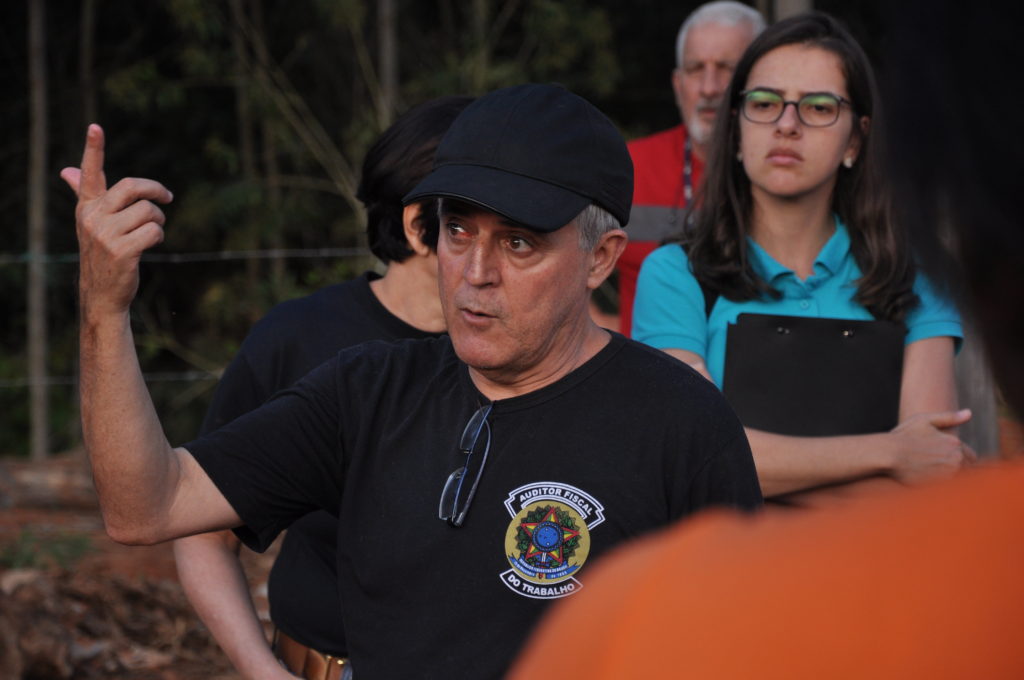
Inspection leader Marcelo Campos tells the workers that the working conditions at the plantation are analogous to slavery. Photo: Maurilo Clareto Costa.
The lead inspector tells the workers that they will stay on the plantation until the morning, at which point they will be housed at a hotel in the town until the paperwork is completed and they receive the money they are owed by the plantation owner as well as three months’ assistance from the government.
A worker asks how they will be paid. “In cash”, answers Campos.
Before the inspectors leave, they exchange telephone numbers with the workers and tell them to call if anything happens.
“Remember, sign nothing unless you’re with us”, says Campos before the inspectors leave the plantation.
Victims of human trafficking
The confidential report issued by the Ministry of Labour and Employment following the inspection declares that the workers on the coffee plantation were the victims of human trafficking. The workers were hired under false pretences by a so-called gato (cat, ed.), and believed that they would be working under totally different conditions. They picked coffee without a contract and without being paid, while they incurred debt for food and transport to the plantation owner.
Brazilian law regarding conditions analogous to slavery
According to the Brazilian criminal code, Article 149, it is illegal to subject a person to conditions analogous to slavery. This includes subjecting a person to forced labour, subjecting a person to degrading working conditions, and restricting a person’s freedom of movement because of debt to an employer or agent.
The living conditions on the coffee plantation are described in the report as degrading, unsanitary, and unsuitable for the large number of workers being housed. The workers did not have access to filtered drinking water, and had therefore been drinking contaminated water, exposing them to the risk of illnesses like hepatitis and diarrhoea, as well as a host of different parasites.
The inspection report by the Ministry of Labour and Employment makes clear that the treatment of the workers constitutes a breach of the International Labour Organization’s (ILO) conventions on forced labour (Conventions 29 and 105), and that the conditions on the plantation are punishable according to a variety of articles in the Brazilian criminal code, including Article 149, which makes it illegal to subject persons to conditions that resemble slavery.
Hundreds of coffee workers are liberated
The internationally recognised human rights advocate Xavier Jean Marie Plassat from the organisation Comissão Pastoral da Terra (CPT), which helps workers to report cases of slavery-like conditions, is in possession of the most widely accepted statistics regarding the prevalence of these conditions on coffee plantations. According to Plassat, these numbers represent a conservative estimate, but they indicate that several hundred coffee workers have been freed from conditions analogous to slavery on Brazilian plantations in the last few years:
2014: 195 workers from six coffee plantations, including 11 children and teenagers, of whom 5 were under 16 years old and 6 were between 16 and 18 years old.
2013: 71 workers from six coffee plantations.
2012: 26 workers from two coffee plantations.
2011: 129 workers from seven coffee plantations, including 2 children and teenagers under 16 years old.
2010: 204 workers from nine coffee plantations, including 4 children and teenagers, of whom 2 were under 16 years old and 2 were between 16 and 18 years old.
It is illegal for children under 16 years old to work on coffee plantations, although children between 16 and 18 years old may do so as long as it does not interfere with their schooling.